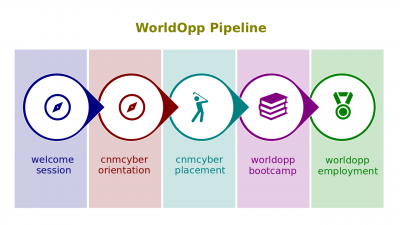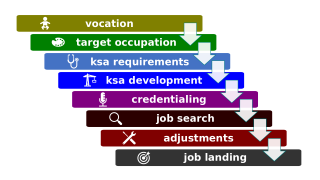Difference between revisions of "Career Waterfalls"
(→Script) |
(→Script) |
||
| Line 18: | Line 18: | ||
:In [[career waterfall]]s, the development progress is seen as flowing steadily downwards through the phases. These phases may vary, but they are planned in advance. | :In [[career waterfall]]s, the development progress is seen as flowing steadily downwards through the phases. These phases may vary, but they are planned in advance. | ||
| − | :One's ''waterfall'' may start with discovering one's [[vocation]]. Usually, a | + | :One's ''waterfall'' may start with discovering one's [[vocation]]. Usually, a teen is asked "who do you want to be when you have grown up?" If the teen doesn't know, a college [[career counselor]] will ask "what do you like to do?" either in person or through some aptitude test. |
| − | : | + | :''Vocation'' suggests one's target [[industry]] and/or [[occupation]] may come next. If parents don't have their vision for their child, the ''counselor'' may introduce him or her to the [[Occupational Outlook Handbook]] or another resource, so the targets can be established. |
| − | : | + | :''Occupations'' come with particular [[occupation-required competence|competence]]; development of one's [[educational credential]]s may take years. For many, the most difficult part is to find an [[entry-level job]] after graduation from [[educational institution]]s. [[Job search]] and landing one's job in the target occupation and/or target industry would end that ''waterfall''. At this stage, the grown-up kid may discover his or her real ''vocation''. |
| − | + | Let's add some real life example; just the name is changed to preserve the privacy. Meet Lisa, who used to believe that management was her vocation. She also felt sympathy to accounting. Her parents believed in that too. She attended a college for 4 years to earn an [[academic credential]] in operations management with concentration in managerial accounting, but no one wanted to hire her because of her lack of [[work experience]]. She started working as a sales representative and eventually stays in that [[occupation]] the most of her professional life. She doesn't regret about her 4 years in a college, and says that it was fun, but she has never managed any operations using managerial accounting in her career. | |
| − | : | + | :That example is not everyone's case, and some waterfall projects can be successful, but there is no way that everything in that many-years project would go as planned and a great chunk of time -- and often money -- wouldn't be wasted. |
:''Career waterfalls'' are sequential. [[Agile methodology|Agile methodologi]]es represent the opposite approach to administration of [[career project]]s. [[Agile career project]]s assume frequent adjustments that reflect the newly-discovered information. | :''Career waterfalls'' are sequential. [[Agile methodology|Agile methodologi]]es represent the opposite approach to administration of [[career project]]s. [[Agile career project]]s assume frequent adjustments that reflect the newly-discovered information. | ||
Revision as of 17:13, 15 May 2020
Career Waterfalls (hereinafter, the Lectio) is the second lesson part of the Career Endeavors lesson that introduces its participants to career projects and related topics.
This lesson belongs to the Introduction to Careers session of the CNM Cyber Orientation. The Orientation is the second stage of the WorldOpp Pipeline.
Contents
Content
The predecessor lectio is What Career Endeavor Is.
Key terms
- [[]].
- Career waterfall. A sequential process where progress is seen as flowing steadily downwards through the phases. These phases may vary, but often consist of (a) discovering one's vocation, (b) suggesting one's target industry and/or occupation, (c) identifying work-related competence needed for a particular position, (d) development of one's KSAs, (e) development one's employment credentials, (f) job search, (g) adjustments to the job market, and/or (h) landing one's job in the target occupation and/or target industry.
Script
- In career waterfalls, the development progress is seen as flowing steadily downwards through the phases. These phases may vary, but they are planned in advance.
- One's waterfall may start with discovering one's vocation. Usually, a teen is asked "who do you want to be when you have grown up?" If the teen doesn't know, a college career counselor will ask "what do you like to do?" either in person or through some aptitude test.
- Vocation suggests one's target industry and/or occupation may come next. If parents don't have their vision for their child, the counselor may introduce him or her to the Occupational Outlook Handbook or another resource, so the targets can be established.
- Occupations come with particular competence; development of one's educational credentials may take years. For many, the most difficult part is to find an entry-level job after graduation from educational institutions. Job search and landing one's job in the target occupation and/or target industry would end that waterfall. At this stage, the grown-up kid may discover his or her real vocation.
Let's add some real life example; just the name is changed to preserve the privacy. Meet Lisa, who used to believe that management was her vocation. She also felt sympathy to accounting. Her parents believed in that too. She attended a college for 4 years to earn an academic credential in operations management with concentration in managerial accounting, but no one wanted to hire her because of her lack of work experience. She started working as a sales representative and eventually stays in that occupation the most of her professional life. She doesn't regret about her 4 years in a college, and says that it was fun, but she has never managed any operations using managerial accounting in her career.
- That example is not everyone's case, and some waterfall projects can be successful, but there is no way that everything in that many-years project would go as planned and a great chunk of time -- and often money -- wouldn't be wasted.
- Career waterfalls are sequential. Agile methodologies represent the opposite approach to administration of career projects. Agile career projects assume frequent adjustments that reflect the newly-discovered information.
Agile Career Projects is the successor lectio.

